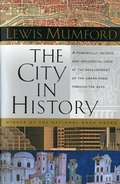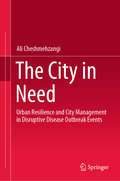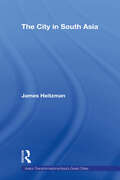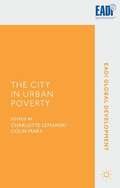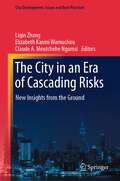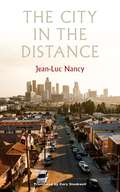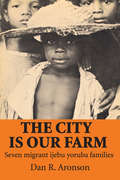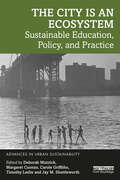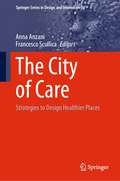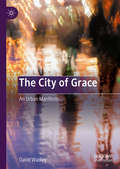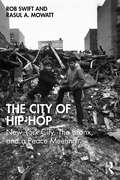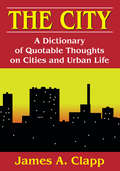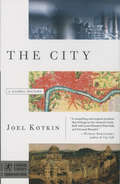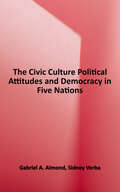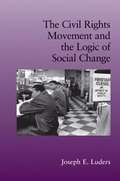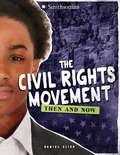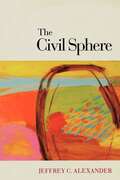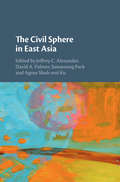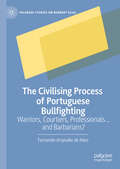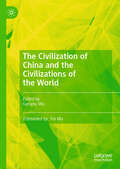- Table View
- List View
The City in History: Its Origins, Its Transformations, and Its Prospects
by Lewis MumfordThe city's development from ancient times to the modern age. Winner of the National Book Award. "One of the major works of scholarship of the twentieth century" (Christian Science Monitor). Index; illustrations.<P><P> Winner of the National Book Award
The City in Need: Urban Resilience and City Management in Disruptive Disease Outbreak Events
by Ali CheshmehzangiThis book fills a major gap in academic research, by exploring ‘urban resilience measures’ and ‘city management issues’ during disruptive disease outbreak events. Based on the overarching concept of ‘resilience thinking’, it addresses critical issues of preparedness, responsiveness and reflectiveness in the event of outbreak, focusing on cities and how they should prepare to combat a variety of adversities and uncertainties caused by outbreaks. This comprehensive book is an essential guide for decision-makers, city authorities, planners, healthcare and public health authorities, and those communities and businesses that face disease outbreak events. It also offers a set of practical measures to support the development of tailor-made strategies in the form of an action plan. These strategies should address outbreak control and containment measures, institutional rearrangements, management of urban systems, and healthiness of the society. Divided into six chapters, this book explores important topics of ‘urban resilience’ and ‘city management’ for preparedness action plans and responsiveness planning. Further, it presents a comprehensive urban resilience approach used to support city management in the recent outbreaks in Chinese cities, which can be applied in cities around the globe to strengthen their resilience and maximise the practicality of urban resilience and minimise urban vulnerabilities during disease outbreaks. Highlighting topics such as maintaining societal well-being, community engagement, and multi-sectoral city management enhancement, this book offers a unique combination of research, practices and lessons learned to aid cities in need.
The City in South Asia (Asia's Transformations/Asia's Great Cities)
by James HeitzmanThe macro-region of South Asia – including Bangladesh, India, Nepal, Pakistan, and Sri Lanka – today supports one of the world’s greatest concentrations of cities, but as James Heitzman argues in the first comprehensive treatment of urban South Asia, this has been the case for at least 5,000 years. With a strong emphasis on the production of space and periodic excursions into literature, art and architecture, religion and public culture, this interdisciplinary study is a valuable text for students and scholars interested in comparative history, urban studies, and the social sciences.
The City in Urban Poverty
by Charlotte Lemanski Colin MarxThe authors respond to the absence of critical debate surrounding the spaces of the city in urban poverty research and policy. While existing research interprets the urban as a static container or empty backdrop for urban poverty processes, the chapters in this book critically explore the active role played by the spaces of the city in shaping and perpetuating urban poverty. Scholars and policymakers from a range of disciplinary perspectives use historic and contemporary examples from Asia,Africa and Latin America to demonstrate the ways in which urban poverty does not just exist in the spaces of the city, but that the city itself is also in urban poverty. So the city is both in and of urban poverty (and vice versa). Attending to the way that spaces of cities are part of the processes that reproduce and perpetuate exploitation and inequality sheds additional light on the dynamics of poverty for researchers and policy makers.
The City in an Era of Cascading Risks: New Insights from the Ground (City Development: Issues and Best Practices)
by Liqin Zhang Elizabeth Kanini Wamuchiru Claude A. Meutchehe NgomsiThis book provides unique perspectives into newly changed political and socioeconomic urban landscapes due to COVID-19 in diverse cities and aims to provide ways to improve the resilience of cities using a global perspective, especially in a post-pandemic era. This book is divided into three sections with seventeen chapters overall. It explores the impacts of the COVID-19 on city planning, building, and maintenance; it considers city resilience and what urban risks cities are facing; and it examines urban development from diverse socioeconomic and political perspectives. The book contains multidisciplinary work by authors from China, African nations (Angola, Burundi, Cameroon, Kenya, Morocco, Nigeria), Canada, Italy, Poland, and France. This manuscript provides a global perspective as cities from Africa, China, as well as some developed countries, such as France and South Korea, were used to collect data and information concerning urban development and risks, past, present, and future responses to COVID-19 as well as any other pandemics and cities' resilience. This book is a valuable asset to urban researchers, urban city planners, urban policymakers, public officials, undergraduates, and postgraduates interested in a comprehensive comparison between diverse socioeconomic and political cities with a unique global and post-pandemic perspective in order to improve urban city resilience.
The City in the Classical and Post-Classical World
by Claudia Rapp H. A. DrakeThis volume examines the evolving role of the city and citizenship from classical Athens through fifth-century Rome and medieval Byzantium. Beginning in the first century CE, the universal claims of Hellenistic and Roman imperialism began to be challenged by the growing role of Christianity in shaping the primary allegiances and identities of citizens. An international team of scholars considers the extent of urban transformation, and with it, of cultural and civic identity, as practices and institutions associated with the city-state came to be replaced by those of the Christian community. The twelve essays gathered here develop an innovative research agenda by asking new questions: What was the effect on political ideology and civic identity of the transition from the city culture of the ancient world to the ruralized systems of the middle ages? How did perceptions of empire and oikoumene respond to changed political circumstances? How did Christianity redefine the context of citizenship?
The City in the Distance
by Jean-Luc NancyFINALIST, 38th ANNUAL FRENCH-AMERICAN FOUNDATION TRANSLATION PRIZEExploring the ever-changing philosophy of city life with Jean-Luc NancyIn The City in the Distance, Jean-Luc Nancy embarks on nothing less than a philosophy of the city. Drawing on his widely discussed accounts of sense and of the fraught question of community, Nancy views the city as the site of a disposition that is constantly undergoing metamorphoses.Far from an abstract account, Nancy attends in the most concrete way possible to the workings of a city not typically taken as paradigmatic, Los Angeles. As Jean-Christophe Bailly suggests in his foreword, Nancy joins Walter Benjamin in thinking the city not from an external vantage point, but on its own terms.
The City is Our Farm: Seven Migrant Ijebu Yoruba Families
by Daniel R. AronsonThe City Is Our Farm examines cultural change in Africa from the vantage point of real human beings caught up in that change. By presenting vignettes from the daily lives of seven households, Professor Aronson presents what is the source of social-science theory: the experience of individuals. To readers who think of development in terms of GNP, political rhetoric, and vague abstractions, this book supplies a much-needed corrective.
The City is an Ecosystem: Sustainable Education, Policy, and Practice (Advances in Urban Sustainability)
by Margaret Cuonzo Deborah Mutnick Carole Griffiths Timothy Leslie Jay M. ShuttleworthThe City is an Ecosystem maps an interdisciplinary, community-engaged response to the great ecological crises of our time—climate change, biodiversity loss, and social inequality—which pose particular challenges for cities, where more than half the world’s population currently live. Across more than twenty chapters, the three parts of the book cover historical and scientific perspectives on the city as an ecosystem; human rights to the city in relation to urban sustainability; and the city as a sustainability classroom at all educational levels inside and outside formal classroom spaces. It argues that such efforts must be interdisciplinary and widespread to ensure an informed public and educated new generation are equipped to face an uncertain future, particularly relevant in the post-COVID-19 world. Gathering multiple interdisciplinary and community-engaged perspectives on these environmental crises, with contemporary and historical case study discussions, this timely volume cuts across the humanities and social and health sciences, and will be of interest to policymakers, urban ecologists, activists, built environment professionals, educators, and advanced students concerned with the future of our cities.
The City of Care: Strategies to Design Healthier Places (Springer Series in Design and Innovation #26)
by Anna Anzani Francesco ScullicaThe book explores care as a transition strategy to a healthier and more sustainable world. After the lesson learned from the pandemic, health as a fundamental human right is increasingly related to a care component: caring for sick people, persons with disabilities, elders, migrants and refugees, women and children, caring for bodies, minds, cities and nature. Endorsing the care system as a female knowledge based on complexity, flexibility, management of the unexpected, sense of responsibility, the project culture can extract this paradigm from the domestic perimeter, bring outside and make it accessible to all in work, politics, relationships, places and communities. The systemic connection between planet and people wellbeing will be grasped through a transdisciplinary perspective that allows to deal with the city of care at a mental, physical, social and global level. The first section addresses care and interior space, dealing with dwelling, working, proximity and cities on a human scale, with a particular attention to the post Covid conditions. The second section deals with healthcare design, the evolution and trend of healing spaces, the influence of technology and robotics on inclusive design processes. The third section considers a social care attitude and deals with the multiethnic urban dimension, care and creativity in design, society and relationships, the right to health of immigrant people.
The City of Grace: An Urban Manifesto
by David WadleyIn this sweeping appraisal of the urban condition, David Wadley argues that anything less that high-level resolution in modelling the well-being of inhabitants is wasting precious time. Humanity is encountering rising entropy, caused by unsustainable economic and demographic expansion. Supported by a strong interdisciplinary backdrop featuring systems and crisis theories, The City of Grace tackles these obstacles by picturing gracious function and graceful form in a human-scale settlement. In an attempt to salvage things lost in the teleology of urban development over the last 100 years, the outlook is both heterodox and contrarian. How long can we all go on in the present way? In addressing grace, a more elevated concept than those focusing previous urban analyses, this manifesto aims not to placate or please but, instead, to get humanity to face the encompassing realities it tries so hard to forget.
The City of Hip-Hop: New York City, The Bronx, and a Peace Meeting
by Rob Swift Rasul A. MowattThe City of Hip-Hop positions a unique conceptualization of the history of Hip-Hop, that it was a combination of forces that produced the environment for Hip-Hop to specifically grow in the geographies of New York City and its boroughs. This book argues it was the political forces of the 1970s combined with the economic forces of free market capitalism and privatization of public services, neoliberalism, and the social forces of the deindustrialization of major cities and displacement of populations that led the cultural creation of the “Boogie Down” Bronx. The City of Hip-Hop shows how Hip-Hop is a socio-political reaction that created an alternate reality with a geographic specificity, and it is the interplay with those forces that nurtured it to become the culture force that we know it today in New York, Philadelphia, Boston, Los Angeles, Chicago, London, Manchester, Liverpool, Berlin, São Paulo, Tokyo, Washington D.C., Seattle, Paris, Houston, Dallas, Miami, Atlanta, Detroit, Toronto, Cleveland, Johannesburg, Barcelona, Belfast, Gaza City, and elsewhere. Once those of us as fans of the culture zoom out to see such a bigger picture, a much-needed criticism and retelling of the culture and art of Hip-Hop emerges as our understanding.This book is essential for preservers of the culture, students, scholars, and general readers interested in urban planning, urban design, urban geography, place-making, American Studies, Cultural Studies, Black Studies, and Latin American Studies.
The City of Joy
by Dominique LapierreLiving in the seeming hell of one of the poorest and most crowded quarters of Calcutta are the saints of today: saints such as Mother Teresa, saints such as Stephen Kovalski, an unknown Polish Catholic priest who made his home there to care for the poorest of the poor. And Max Loeb, an American physician dedicated to fighting disease in this dirty hellhole. City of Joy, the story of these saints, is a testament to the human spirit unbowed by the most wretched of circumstances.
The City of the Senses
by Kimberly DefazioOffers an innovative, interdisciplinary approach which opens up new ways of understanding urban culture and space. The author approaches the city as essentially a 'material' place where people live, work, and participate in social practices within historical limits set not by sensory experience or cultural meanings but material social conditions.
The City: A Dictionary of Quotable Thoughts on Cities and Urban Life
by James A. ClappThe City is the best, funniest, saddest, and most thought-provoking compilation ever assembled on the urban scene. James A. Clapp has arranged more than three thousand quotations—epigrams, epithets, verses, proverbs, scriptural references, witticisms, lyrics, literary references, and historical observations—on urban life from antiquity until the present. These quotes are drawn from the written and spoken words of more than one thousand writers throughout history.This volume, with contributions from speakers, poets, song writers, politicians philosophers, scientists, religious leaders, historians, social scientists, humorists, architects, journalists, and travelers from and to many lands is designed to be used by writers, speechmakers, students, and scholars on cities and urban life. Clapp's text is striking for its sharp contrasts of urban and rural life and the urbanization process in different historical times and geographical areas.This second edition includes four hundred new entries, updated birth dates and occupations of quoted authors, and an expanded and updated introduction and preface. Clapp also added new introduction pages for each section containing pictures and unique quotations. The indexes have also been expanded to include more subjects and cities. The scope of this book is international, including entries on most major and many minor cities of the world. It is noteworthy for its pleasures as well as its insights.
The City: A Global History (Modern Library Chronicles)
by Joel KotkinJoel Kotkin's short book is an account of the city through history, from its prehistoric precursors to its future. It examines how the urban form has evolved over the course of its history, and places particular emphasis on the timeless role of the city as the crossroads of peoples and cultures, as a locus of trade, and as an artistic centre.
The Civic Culture Transformed
by Russell J. Dalton Christian WelzelThis book reevaluates Almond, Verba, and Pye's original ideas about the shape of a civic culture that supports democracy. Marshaling a massive amount of cross-national, longitudinal public opinion data from the World Values Survey Association, the authors demonstrate multiple manifestations of a deep shift in the mass attitudes and behaviors that undergird democracy. The chapters in this book show that in dozens of countries around the world, citizens have turned away from allegiance toward a decidedly "assertive" posture to politics: they have become more distrustful of electoral politics, institutions, and representatives and are more ready to confront elites with demands from below. Most importantly, societies that have advanced the most in the transition from an allegiant to an assertive model of citizenship are better-performing democracies - in terms of both accountable and effective governance.
The Civic Culture: Political Attitudes and Democracy in Five Nations, An Analytic Study (The Little, Brown Series In Comparative Politics)
by Sidney Verba Gabriel A. AlmondIn The Civic Culture, Gabriel A. Almond and Sidney Verba apply the modern techniques of social research to some of the classic problems of comparative politics. It is a study of the political culture of democracy. It describes the political beliefs, aspirations, emotions, and actual participation in politics of citizens in five countries--Germany, Italy, Mexico, Great Britain, and the United States. Their purpose in presenting this book is to give an understanding of the relationship between the attitudes of citizens and the functioning of modern democratic states. The Civic Culture is based on one of the largest cross-national surveys ever attempted in the field of comparative politics. Over 5,000 interviews were conducted as a basis for the book. This abridgment of The Civic Culture contains the substantive portions of the clothbound edition published by the Princeton University Press in 1963. It is essentially a condensation and no material changes have been made. Some of the data reproduced in the larger edition are not reported here. The principal difference lies in the absence of description and discussion of the methodological apparatus of the study. For a fuller discussion of the methodological problems of cross-national survey research, of the sample used in this study, and for a full report of the questionnaires used, the reader is invited to consult the clothbound edition.
The Civil Rights Movement and the Logic of Social Change
by Joseph E. LudersSocial movements have wrought dramatic changes upon American society. This observation necessarily raises the question: Why do some movements succeed in their endeavors while others fail? This book answers this question by introducing an analytical framework that begins with a shift in emphasis away from the characteristics of movements toward the targets of protests and affected bystanders, their interests, and why they respond as they do. Such a shift brings into focus how targets and other interests assess both their exposure to movement disruptions as well as the costs of conceding to movement demands. From this vantage point, diverse outcomes stem not only from a movement's capabilities for protest but also from differences among targets and others in their vulnerability to disruption and the substance of movement goals. Applied to the civil rights movement, this approach recasts conventional accounts of the movement's outcome in local struggles and national politics, and also clarifies the broader logic of social change.
The Civil Rights Movement: Then and Now (America: 50 Years of Change)
by Dan ElishDiscusses the main concerns of the Civil Rights movement in the 1960s, and how those have evolved since; what's changed for the better, what might be worse, and where do we go from here.
The Civil Sphere
by Jeffrey C. AlexanderWhat binds societies together and how can these social orders be structured in a fair way? Jeffrey C. Alexander's masterful work, The Civil Sphere, addresses this central paradox of modern life. Feelings for others--the solidarity that is ignored or underplayed by theories of power or self-interest--are at the heart of this novel inquiry into the meeting place between normative theories of what we think we should do and empirical studies of who we actually are. Solidarity, Alexander demonstrates, creates inclusive and exclusive social structures and shows how they can be repaired. It is not perfect, it is not absolute, and the horrors which occur in its lapses have been seen all too frequently in the forms of discrimination, genocide, and war. Despite its worldly flaws and contradictions, however, solidarity and the project of civil society remain our best hope: the antidote to every divisive institution, every unfair distribution, every abusive and dominating hierarchy. This grand, sweeping statement and rigorous empirical investigation is a major contribution to our thinking about the real but ideal world in which we all reside.
The Civil Sphere in East Asia
by Jeffrey C. Alexander David A. Palmer Agnes Shuk-mei Ku Sunwoong ParkLeading sociologists who live and work in East Asia examine their region's most dangerous and explosive social problems, and some of their most stunning success stories, from the viewpoint of Civil Sphere Theory. This new and increasingly influential sociological understanding of democracy aims to describe and explain the moral codes and institutional foundations of democratic solidarity, as it manifests itself within a distinct social sphere. Part of a multi-volume project, this collection includes cases from Japan, mainland China, Hong Kong, Taiwan, and South Korea, bringing together efforts by sociologists based in East Asian academic institutions. Through an extraordinary blend of sophisticated social theory and path-breaking empirical research, The Civil Sphere in East Asia aims to advance civil sphere theory by globalizing and regionalizing it at the same time.
The Civilising Process of Portuguese Bullfighting: Warriors, Courtiers, Professionals...and Barbarians? (Palgrave Studies on Norbert Elias)
by Fernando Ampudia de HaroThis book uses Norbert Elias&’s theory of the civilising process to provide a sociological and historical study of Portuguese bullfighting. Its aim is to understand how bullfighting is historically configured according to the transformations undergone by the society in which it takes place. This means that bullfighting is approached in terms of its relationship with factors such as social structure, state power, the control of violence and the sensitivities and behaviours of different social groups. Its evolution and its construction as an activity can only be explained if we look at these factors from a sociological perspective that takes into account the passage of time. Such a view allows us to think of bullfighting in process and figurational terms. It means going back a thousand years and reconstructing a journey that, overall, cannot be described as a simple succession of facts, laws, dates and decisions by great personalities. On the contrary, this book argues it is a journey subject to the logic of changes in society, power relations and patterns of behaviour considered suitable for social life. And, as a path, it is not defined at random. It has a direction: bullfighting has been moving towards formalisation and pacification for centuries.This book is of special interest to students and scholars of sociological theory, historical sociology, Eliasian theory, and human-animal relations.
The Civilization of China and the Civilizations of the World
by Genyou WuThis book talks about “Human Spirit and its Manifestations: A ‘Civilizational’ Perspective”, “Image and Expectations: China from the Perspective of the ‘Other’ Lecture Series”, “Civilization Communication and Mutual Enrichment”, and “Civilizational Problems: A Cavalier Perspective”. Civilization is a kind of spiritual achievements with a holistic feature that is structural but not easy to see thoroughly in culture. This determines that “dialogue among civilizations” is not only a continuous and holistic cultural exchange activity, but also a material and spiritual exchange activity in different fields. With the growth of international peace power represented by China, the cultural exchanges and mutual learning activities among all ethnic groups in the world will be further promoted at a new height and breadth. The academic research on “dialogue among civilizations” followed in this book will also contribute to the arrival of this era. This book is suitable for general readers and scholars who are interested in Chinese culture, Chinese civilization, cultural exchanges, and mutual enrichment.
